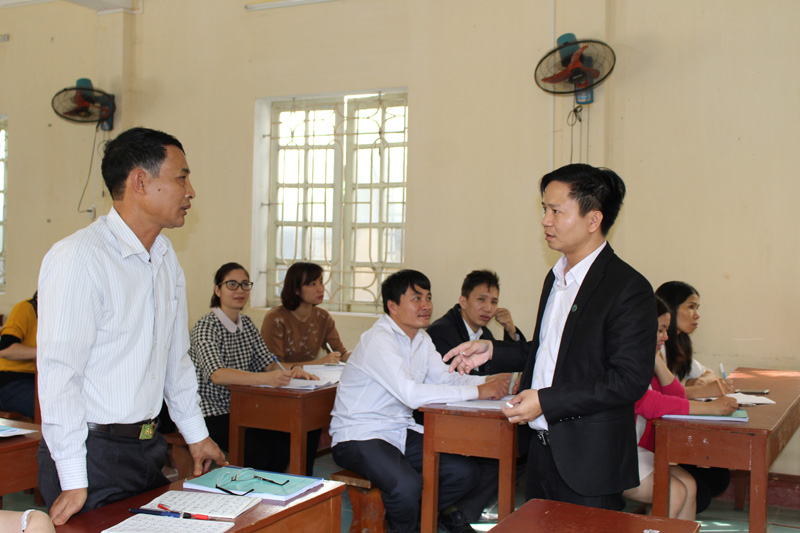
(HBO) - Based on the actual needs of many officials, staff, civil servants and armed force working in ethnic minority area without knowing their languages or understanding their cultural identities of Thai, Mong, Muong ethnics, the effectiveness of their work has been impacted a lot. Therefore, since 2010, the provincial center of continuing education officially opened training classes in Thai and Mong languages. After 7 years, the provincial center of continuing education has opened 19 training courses for about 1,243 learners. This makes an important contribution for the officials and staff to fulfill their tasks well in the ethnic minority areas.
To attract learners, the center has carried out many solutions, such as designing questionnaires and sending them to all the departments, boards and industries, or the media agencies to enroll. At present, the provincial center of continuing education has affiliates with the provincial police department, the department of domestic affairs to regularly open the courses of Thai, Mong language courses. In some districts, the center closely coordinated with the centers of continuing educations of Mai Chau, Da Bac, Lac Thuy districts to open the courses with the most suitable timetables and locations for the learners to join.
Teachers and learners practicing their communications in Thai language in one lesson of Thai language for the intake 16 at the provincial center of continuing education.
Mr. Le Ngoc Hop, the Deputy Head of Board of training and fostering for improving degrees in the provincial continuing education center said: To ensure the training quality, the center has recruited the ethnic minority teachers who have good qualifications, high pedagogy and a lot of experience of teaching. The teaching materials have been issued by the provincial People’s Committees; the syllabus had to be guided carefully by the provincial Department of Education and Training based on the curriculum of the ethic language teaching programme from the Ministry of Education and Training. The time limit for teaching Thai and Mong languages is usually 323 periods, the course includes two sessions: a session of learning the letters and spelling, then learning 9 topics (38 periods) and another session of revisions and getting the certificate (12 periods). At the end of each course, the center organizes for learners to have real practice in the ethnic minority areas of Thai or Mong people so that they can communicate, exchange the customs and culture with ethnic people.
In the school year of 2016-2017, the center has trained and given certificates for 7 courses with 462 learners. Since the beginning of this year, the provincial center of continuing education has opened 4 classes with 365 learners. Talking about the effectiveness of attending an ethnic minority class in the provincial center of continuing education, Mr. Ngo Minh Dan- Vice Head of Advisory Office (Provincial Police Department), the learner of intake 14 of Thai ethnic language, said: For my job requirements of collaborating regularly with the ethnic minority people, I have to understand their language and the cultural identities, I took a course of Thai minority language held by the provincial center. Since then, I have felt confident to communicate and exchange with Thai ethnic people so that I could successfully fulfill my assigned tasks of propaganda and mobilization of ethnic Thai people to strictly observe the law. In the near future, I will register for a Mong and Muong ethnic languages.
Following the direction of the Vietnam Women's Union (VWU) Central Committee, the Hoa Binh provincial Women's Union has proactively and extensively implemented the "Godmother" programme with various practical and creative solutions to support and care for children who become orphans due to the COVID-19 pandemic and other causes. As many as 448 children have received both material and spiritual assistance in the 2021–2025 period.
More than just an information technology teacher, Bui Van Nien is an inspiring figure who has nurtured the scientific curiosity and creative spirit of students in Vietnam’s ethnic minority communities.
Da Bac is the most disadvantaged mountainous district in Hoa Binh province, with ethnic minorities accounting for about 90% of its population. Over the past years, the district has mobilised resources to implement ethnic policies to improve the quality of life of local people.
In recent years, Hoa Binh province has consistently prioritised the protection, care, and education of children, particularly those from ethnic minorities and disadvantaged backgrounds, by creating a safe, healthy, and nurturing environment for their all-round development.
The Steering Committee for Tobacco Harm Prevention and Control of Hoa Binh province, in coordination with the Tobacco Harm Prevention and Control Fund, held a ceremony on May 28 in response to the World No Tobacco Day (May 31) and the National No Tobacco Week (from May 25 to 31). The event was chaired by Nguyen Van Toan, Standing Vice Chairman of the provincial People’s Committee and head of the Steering Committee.
Since 2021, the Center for Industrial Promotion and Industrial Development Consulting (CIIDC) under the Department of Industry and Trade has been implementing a school lighting model as part of the plan for using energy efficiently and economically in Hoa Binh Province in the pẻiod of 2021 - 2025. This model not only aims to improve the learning conditions and enhance the education quality, but it also promotes the message of energy saving, energy security, environmental protection and contributes to the goals of socio-economic development.



